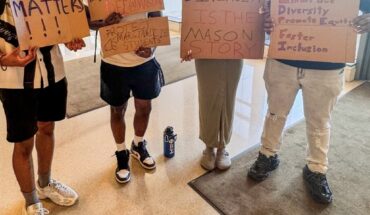This semester, a new student group has formed to be a voice for under-represented groups in the Honors College.
Honors College Black Ambition (HCBA) was formed by two University Scholars, Juniors Desmond Moffitt and Nakia Ridgeway, at the end of last semester. HCBA plans to meet with Zofia Burr, Dean of the Honors College, and other faculty to discuss ways to improve the college experience of its African American members.
“We’re basically a student advisory board for the Honors College,” Ridgeway said.
She said HCBA’s purpose is to have minority students’ voices heard.
“We wanted to make sure that under-represented students, such as African Americans, have a voice with their peers and with the faculty, specifically within the Honors College,” Ridgeway said.
Moffitt said another purpose of the group is to “address the general culture of the Honors College.”
He said HCBA will focus on making African American honors students feel like they are a part of the college.
“One thing that I feel like was pretty common was that they didn’t feel too connected to the Honors College,” Ridgeway said.
She said that she hopes HCBA can be the solution.
“That’s one thing we’d like to try to see if we can change for African American students, providing that bridge between their lives and the Honors College,” Ridgeway said.
Moffitt said HCBA also plans to address the question, “[W]here does race fit when talking about multiplicative perspectives[?], which is something honors students are taught from the moment they sit in their research methods class.”
Moffitt said he realized that a group like HCBA was needed through his work with MasonU, which helps under-represented K-8 students see that college is a possibility. He encouraged minority students in the Honors College to join as a way to encourage the minority students who visited campus through MasonU.
“I found many minority students who didn’t feel that the Honors College reflected a community of learners where everyone was given equal access to the college, causing them to ‘disown’ the Honors College and look to other organizations on campus,” Moffitt said. “Then question arose: how can we try to have empathy for local students when we don’t even address the same issue in our own backyard?”
Moffitt said the name Black Ambition reflects the group’s drive to create change.
“Black Aspire was chosen. After talking with Dr. Zofia Burr…she suggested that ambition had a very similar meeting to aspire, however, ambition was stronger and more indicative of our commitment to address the cultural competency issue in the Honors College,” Moffitt said.
He said Honors College Black Ambition will make the college the best it can be.
“The Honors College has so much potential to do great work, but it can’t if not all of the potential within it is being tapped,” Moffitt said. “Hopefully, this initiative will inform others that if the Honors College doesn’t feel like home, then are things we can do as a student body to change that. All we have to do is use the energy we use to complain, to work toward a solution of the issue.”



